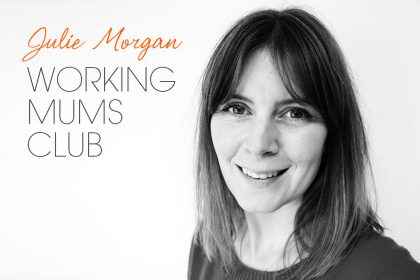How to navigate change with confidence
We can’t always change what happens to us. But we can change how we react to it. Learn why change is important for all of us, and how you can learn to embrace it with confidence.
New years are are often a time of fresh starts. We may decide that this is the year we’re going to be fitter, healthier, better versions of ourselves, and make all kinds of positive changes to our lives.
But over the next 12 months there may also be many changes that, on the face of it, aren’t so positive. Changes that we may not have chosen (or want) for ourselves.
How can we learn to not just cope with these changes, but actually embrace them, and confidently turn them into positive opportunities for ourselves? Ling Wong from Business Soulwork shares three tips to help you.
Change is inevitable – and good
As multi-tasking, multi-talented mums we often have to deal with changes, uncertainties and curve balls. Not only from the everyday stuff like kids, family, work/business, friends etc, but also from our need to achieve fulfillment and satisfaction through what we do, and how we do it.
We don’t want to be stagnant – we want to get more out of life. And with that desire, we have to accept change will happen, and dealing with uncertain situations is par for the course.
In the personal development world, the word ‘acceptance’ is thrown around a lot. It is easy to accept our circumstances when we are comfortable in the status quo – even if we are dissatisfied with it, there is a certain level of comfort that makes accepting it feel safe.
Fear of change is human
The rubber meets the road when we are in the midst of change – when nothing around us is familiar and we have to get comfortable with the changes in front of us. And this can happen for our career, our business, or our personal life.
For most of us, we WANT change. But when the change really happens – not changes in far away politics, but those close to home, that affect our personal circumstances – we freak out and we may even self-sabotage.
Fear of change is human nature – after all, what has been working is keeping us alive, right? It is part of us, so instead of suppressing it, we need work with it and embrace it.
Overcoming your fear of change
The first step to overcoming a fear is to acknowledge it (and therefore accept it), then objectify it. To understand that even though it’s part of us, it does not define us.
A simple method I like to use is to become familiar with how fear feels for me, and how I react to it. For example a certain body part may tense up, or I’ll find myself doing ‘busy work’ to procrastinate.
When this happens, I actually say out loud: “It’s just my fear of change, and I am NOT my fear”.
After I have created that distance between myself and my fear, I can then have a dialogue with that part of me to understand what it needs in order to feel safe.
You always have a choice whether to give yourself what you need, or not. The key is to acknowledge all parts of yourself – to recognise when you’re fearful of something – because when you suppress a negative feeling, it will come back to bite you by triggering self-sabotaging behaviours.
To feel safe you need to navigate with confidence
For our subconscious to feel safe amid change, we need to show confidence when navigating uncertainty, so we can stay on course while fears and doubts arise.
But how can you cultivate confidence? I’m not talking about puffing up and being obnoxious or arrogant! True confidence comes from the trust that we have it in us to achieve what we want.
In order to gain this confidence, you need a strategy to help you manage change, and feel like you’re in control.
Three steps to navigating change with confidence
To help you do this, I have identified three important steps.
1) Know where you are going
Knowing where you are going and what you want to achieve will help you make decisions that bring you closer to what you desire.
Uncertainty opens up possibilities and opportunities, which is a beautiful thing. However, it also comes with the Bright Shiny Object Syndrome that can send us down rabbit holes.
Many people complain about not having enough time to do what they need to do (which makes uncertain circumstances more stressful). But the truth is, it’s not because they have too many must-do’s, but they are chasing bright shiny objects, attending to other people’s problems and doing busy work rather than focusing their time and effort on what really matters.
In times of change and uncertainty, our confidence can waver more easily than usual, and it takes a bigger effort to keep the eye on the prize and stay on course so we are indeed changing for the better.
We want to use our big vision as a filter to help us determine what meaningful actions to take. You don’t want to be doing busy work because others say so, and then realise that it sends you running many different directions but contributes nothing to you being YOU.
2) Show up to whatever shows up to you
We don’t always have a choice on how things turn out, and sometimes we can find ourselves presented with a difficult path. I don’t advocate blindly muscling through everything and ignoring how you feel. And I am certainly not suggesting you finish projects that are no longer in alignment with your core.
But if what you are in is the process that will bring you closer to clarity and alignment? In that case you can’t afford to walk away when the going gets tough – you need to show up for it.
This means being present, engaged, taking the punches and riding through the tough times, learning, growing and exploring along the way.
It means doing what’s in front of you – taking action and keeping the momentum is important to any success. You cannot take the right course unless you are actually moving.
So even though you may not be certain about the end game or every little piece of the ‘how’, there are usually some small yet definitive steps you can take right here right now. Just take the next step, follow the breadcrumbs and trust.
3) Trust
Sometimes, successfully navigating change just comes down to trusting that the path will appear as you take the steps. It’s about doing what feels ‘right’ (your gut instinct) instead of succumbing to the chatter of your mind that gets you frozen in analysis paralysis. It’s also about trusting that you’ve got what it takes to succeed.
More often than not, it’s about trusting that YOU’VE got what it takes, and as a result, making space to let your intuition and internal GPS work and show you where you need to go.
Most of us over-think trust, and under-feel it. But trust isn’t an intellectual exercise, like a word you toss around and call it a day.
You can *think* about trusting till you turn blue in the face. You can recite positive affirmations and think happy thoughts till the cows come home. But if you don’t EMBODY trust, you are still playing the yo-yo diet of ‘roses and unicorns’ then ‘pain and gore’.
Trust isn’t something you can fake. If you keep saying “I have faith that the universe will bring me abundance” but turn around and switch into panic and self-doubt, you are not yet trusting – and as a result, you won’t benefit from the confidence and intuition that comes from genuine, heart-felt trust.
I like to think about athletes – when they are in the field, they run, swim, bike, hit the ball… or do whatever they do to get to the finish line. They don’t stop every five minutes and analyse if they are going the right direction. If they did, they’d never win a race! They trust that the finish line is there, and they’ve done the right training they need to win.
So find out where trust lives in your body. And when you’re in doubt, bypass your brain and get to where trust lives. Feel it, turn it up and be on your way.
Stop resisting change – and start embracing it
Without change, we will all become stuck and stagnant. So whether change is visited upon you or you have chosen it, stop resisting it and embrace the uncertainty, confident you have the personal resources to turn it into something ultimately positive.
If you need to, accept that the only constant is change. Stop making yourself a victim of it and start taking the driver’s seat – and make 2015 your year – whatever happens.
Ready to change your perspective, upgrade your mindset and LIVE your potential? You can find Ling and download her free ‘Reignite Your Fire’ Soul-Bomb at Business Soulwork.










